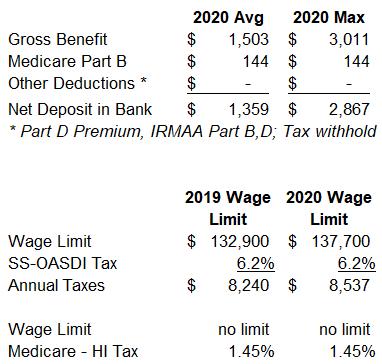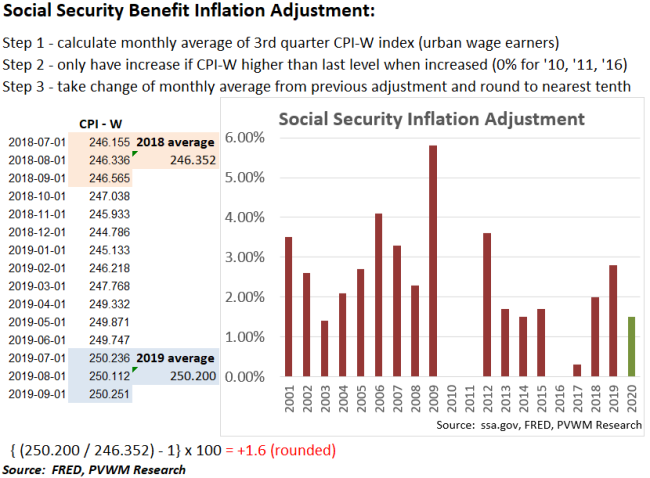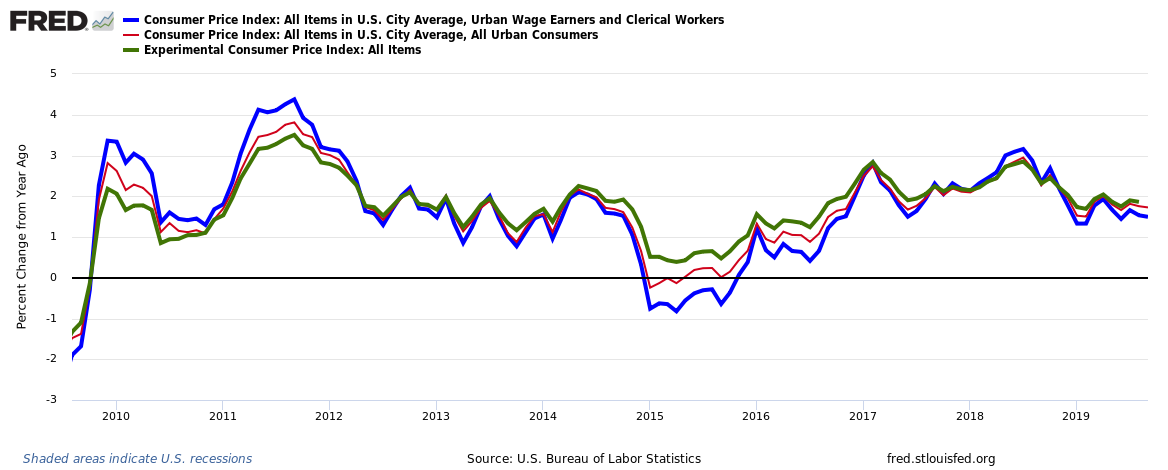
2020 Social Security Inflation: 1.6% for Benefits; 3.6% for Wage Limit on FICA
The 2020 inflation adjustments for Social Security benefits and maximum salary subject to OASDI payroll taxes have been finalized. Benefits will increase 1.6% before Medicare premiums are deducted. For the average benefit this is an increase of $24. The maximum wage limit subject to the 6.2% portion of SS taxes will rise 3.6% to $137,700. Medicare premiums for 2020 have not been officially announced but the spring Trustee report showed an expected increase of $8.80 per month. Here is the impact in dollar terms for an average and maximum monthly benefit.
I only show the standard Medicare Part B premium in the table above. Many also have a Part D premium deducted which varies based on the plan purchased. Also, those on Medicare with modified adjusted gross income (MAGI) above $85,000 for single and $170,000 filing jointly pay an extra Income-Related Monthly Adjustment Amount (IRMAA). Here is a link to the 2019 IRMAA tables; expand Part B and D under 'Detailed Medicare cost information'. The MAGI from 2018 tax return is used for 2020 premiums. If you retired since 2018 and income is lower, consider filing form SSA-44 to challenge the extra premiums.
The graphic below shows the calculation steps to arrive at the 2020 benefit increase and recent history of actual increases.
Note the inflation index used for Social Security is the non-seasonally adjusted index for wage earners (CPI-W), not the more common seasonally adjusted index for all urban consumers (CPI-U) used in regular inflation reports reported in the media. There is also an experimental inflation index called CPI-E which captures the common basket of goods and services for those age 62+. There are years when these different indices can diverge significantly. Last year the difference was less than 0.10%; this year the CPI-E is about 0.30% higher. The graph below shows these indices over the past ten years (Note: no shaded area for recession!). The common CPI inflation number in the news every month is the red line.
For those working and paying into Social Security (6.2% payroll tax for SS on wages up to $137,700 for 2020), the increase in wages subject to this tax is based on a different index – the ‘national average wage index’. Recall there is an additional 1.45% payroll tax for Medicare that is applied to all wages (not capped), plus an additional 0.9% on earnings above $200,000 for individuals and $250,000 if married filing jointly (NOT indexed to inflation). Your employer also pays these taxes (or you if self-employed), except the extra 0.90%. For those interested in a deeper dive, see my blog post on Social Security and Medicare Financial Overview.
Enjoy the increase if receiving benefits and tell your family and friends who are impacted.
Posted by Kirk, a fee-only financial advisor who looks at your complete financial picture through the lens of a multi-disciplined, credentialed professional. www.pvwealthmgt.com




